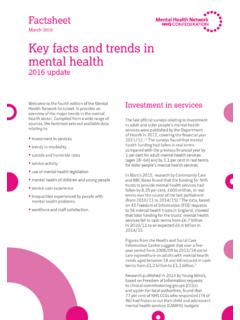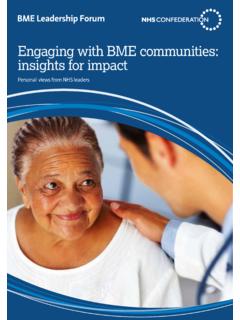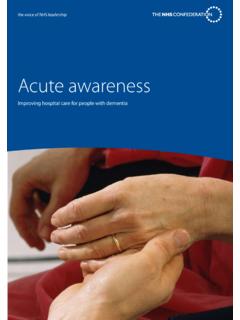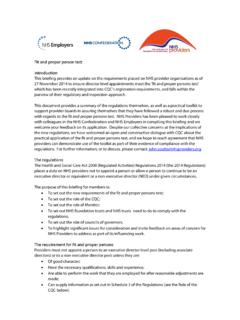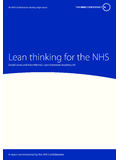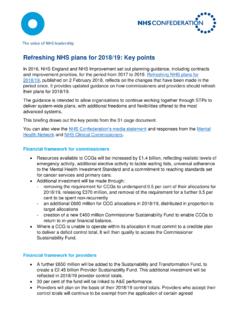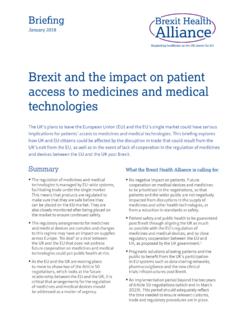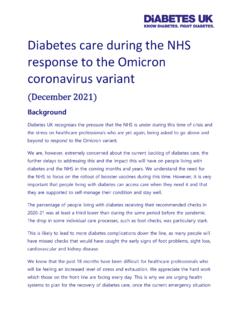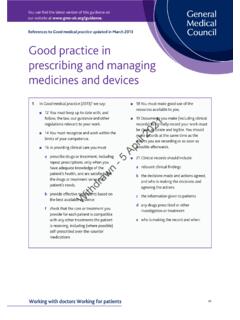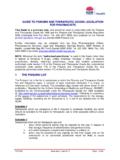Transcription of The role and functions of CCG medicines optimisation teams
1 July 2021 Laura AngusThe role and functions of CCG medicines optimisation teamsAboutAboutThis report reflects on the crucial role and functions that clinical commissioning group medicines optimisation teams deliver in the existing healthcare architecture to improve patient care. The NHS Confederation is the membership body that brings together and speaks on behalf of organisations that plan, commission and provide NHS services in England, Northern Ireland and Wales. The members we represent employ million staff, care for more than 1 million patients a day and control 150 billion of public expenditure. We promote collaboration and partnership working as the key to improving population health, delivering high-quality care and reducing health Clinical Commissioners, which is part of the NHS Confederation, is the membership organisation for clinical commissioning the author About the author Laura Angus is head of prescribing/strategic lead pharmacist at NHS Vale of York CCG and interim lead pharmacist for Humber, Coast and Vale Partnership.
2 Through her career, she has worked in most sectors of pharmacy, including working in GP Practices as a practice pharmacist, community pharmacy, hospital pharmacy, and in education and training as a teacher practitioner at the University of Bradford and as a regional professional training manager for Lloyds Pharmacy. Since 2017, she has been a council member for PrescQIPP, a community interest company, and was previously a NICE medicines and prescribing associate. Laura is grateful to the NHS North Yorkshire CCG medicines optimisation Team for their contribution identifying the roles and functions set out in this report and Kate Day for her support in editing this publication. Contents4 The role and functions of CCG medicines optimisation teams Contents7 Key points11 Introduction11 Why do we need a CCG medicines optimisation team?
3 12 What is medicines optimisation ? 12 medicines optimisation teams13 Common misconceptions14 The medicines optimisation agenda15 medicines optimisation within the health and social care system16 Roles and functions17 medicines commissioning: formulary, pathways and services17 Formulary17 The NHS Constitution18 Area prescribing committees and formulary processes20 Formulary21 Shared care/interface issues22 Audit of the use of new medicines22 Individual funding requests23 Pathways and services23 New commissioned services/new patient pathways24 NHS RightCare25 Therapeutic area reviews26 medicines finance26 Management of prescribing and medicines budgets27 Analysis of data27 Cost pressures27 Correct prescribing codes/budgets/cost centres28 Public health recharges28 Other providersContents5 The role and functions of CCG medicines optimisation teams 28 QIPP29 Rebates30 Priority Prescribing Programme 30 Self-care programme30 Other QIPP programmes31 Contracts/enhanced services32 Pharmaceutical funding approval33 medicines safety
4 And quality33 Safety programmes34 National medicines Safety Programme36 PINCER: Pharmacist-led IT-based intervention to reduce clinically important medication errors in primary care37 ePACT2 medicines safety indicator/dashboard38 Antimicrobial stewardship (AMS)41 Deprescribing42 Reducing the prescribing of potentially addictive medication44 Stopping overmedication of people with a learning disability, autism, or both (STOMP)47 Controlled drugs advice and monitoring48 Patient-group directions49 Primary care support49 Structured medication reviews49 Repeat prescribing processes50 Electronic transfer of prescriptions and electronic repeat dispensing51 Computerised clinical decision support systems52 Care Quality Commission (CQC) support 52 medicines quality in commissioned services52 Non-medical prescribing lead54 NICE medicines and prescribing associates55 medicines across the system: collaboration, coordination and support55 Networks and leadership55 System leadership55 Vaccination programme56 Supporting the pharmacy workforce57 Clinical pharmacists in GP practices/primary care networksContents6 The role and functions of CCG medicines optimisation teams 57 Education and training58 Public health58 Community pharmacy59 NHS Discharge medicines Service60 Community Pharmacy Consultation Service60 Social care.
5 Care homes, domiciliary care and other care providers 61 Online ordering for care homes (proxy ordering)62 medicines optimisation in care homes63 Information and queries 63 Prescribers63 Patients, carers and public64 Shortages and supply65 Viewpoint67 References7 The role and functions of CCG medicines optimisation teams Key pointsKey pointsThe healthcare architecture in England is changing. To support the integration of care services, the government s white paper, Integration and Innovation,1 sets out a plan to establish statutory integrated care systems (ICSs). These bodies will replace and take over commissioning functions from clinical commissioning groups (CCGs) in April 2022, moving to a strategic resource planning approach. Ahead of this transition, this report reflects on the crucialrole and functions that CCGs medicines optimisation (MO) teams currently deliver in the existing healthcare architectureto improve patient care.
6 medicines are the most commontherapeutic intervention and the second highest area ofNHS spending after staffing costs. They are associated witha high degree of clinical and financial risk. CCGs medicinesoptimisation work, therefore, plays a vital role in improvinghealth outcomes and ensuring the most efficient use of NHSresources. ICSs* are tasked with enabling system working, collaborationand integration. medicines optimisation is one of the goldenthreads that run between all sectors of care, whether in* Broader details of the transition to Integrated Care Systems are addressed by theNHS Confederation in our report Legislating on the NHS in The role and functions of CCG medicines optimisation teams Key pointsprevention or treatment. CCG teams work as lynchpins for the medicines optimisation agenda, connecting different parts of the system.
7 This makes CCG expertise well placed for this new world, linking and coordinating with multiple stakeholders acute hospitals, mental health providers, GP practices, community pharmacies, social care providers, local authorities, and other care providers seeking to smooth the journey for patients between different providers of care. In supporting this report, NHS Clinical Commissioners (NHSCC) hopes that ICSs and national policymakers will build their knowledge of CCG medicines optimisation and ensure the safe transfer of it as a commissioning function within the new architecture. The opportunity for leveraging the transition of the functions set out in this report to ICSs to enhance medicines optimisation improving both quality of care and delivering financial efficiencies is set out in a forthcoming report, The Systemisation of medicines optimisation .
8 This paper sets out four main themes which outline the role and functions of CCG medicines optimisation teams :1. medicines commissioning: formularies, pathways and services: The MO team is responsible for commissioning medicines for the CCG-responsible population using approved processes leading to inclusion in the local formulary. The skills required for the thorough appraisal of medicines critical appraisal, data analysis, assessment of clinical and cost-effectiveness and value for money apply to the wider commissioning environment, and the MO teams are also involved in commissioning services and pathways, either in their own right or as part of wider commissioning medicines finance: the MO team is involved in setting and monitoring the primary care prescribing budget, and responsible for workstreams to manage expenditure.
9 9 The role and functions of CCG medicines optimisation teams Key pointsMany CCG MO teams also play an active role in setting, monitoring and managing the budget for expenditure on high-cost drugs in commissioned safety and quality: the MO team works acrossthe system to implement, support and monitor high-quality,safe prescribing and use of medicines , including actionsto improve antimicrobial stewardship, reduce inappropriateprescribing, implement national alerts and assure quality incommissioned across the system: collaboration, coordinationand support: The MO team acts as a link or bridgebetween disparate parts of the medicines system,providing information, supporting the implementation ofcross-sector working, improving communication, andencouraging joined-up provision. The diagram on page 10 shows most of the roles and functionswhich sit under these headings, but the list continuouslyevolves and this iteration should not be considered to beexhaustive.
10 The themes themselves are one way of organisingand presenting the wide variety of activities that MO teamsundertake. In practice, few of the activities sit fully under oneheading and many overlap. As ICSs start to take place in their shadow form, we hope thatthe role of medicines optimisation is truly considered in advanceof structures and governance processes being established. Thewhite paper refers to the need for ICSs to embed system-wideclinical and professional leadership through their partnershipboard and other governance arrangements. As we set out in aforthcoming report, medicines optimisation should be part ofthis system-wide clinical and professional leadership; diverseclinical leadership belongs in all places where clinical decisionsare being made. Key points10 The role and functions of CCG medicines optimisation teams PINCER STOMP Deprescribing Antimicrobial stewardship CQC support medicines waste reductionand sustainability Reducing prescribing ofaddictive medicines Clinical drugs advice andmonitoring medicines and safety programmes Patient group directions Structureed medicines reviews Repeat prescribing Electronic transfer of prescriptionsand electronic repeat prescibing Computerised clinical decisionsupport Non-medical prescribing NICE medicines and prescribingassociateFigure 1.
